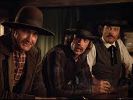Eye For Film >> Movies >> The Long Riders (1980) Film Review
The oft-immortalised Jesse James and his gang provide the subject for Walter Hill's languid 1980 western The Long Riders. Like cinema's most reincarnation of Jesse James, the rather less succinctly titled The Assassination of Jesse James by the Coward Robert Ford, the fatalistic underbelly of The Long Riders anchors the mythology of James and the Wild Wild West into a rather more timeless telling of the story.
Jesse James and his brother Frank (played by brothers James and Stacy Keach) are joined on their bank-robbing trails by the Younger brothers - Cole, Jim and Bob (played by real-life brothers David, Keith and Robert Carradine) - and the Millers, Ed and Clell (played by another set of brothers, Randy and Dennis Quaid).

The large cast of characters (and abundance of real-life brothers) initially give the film a breezy, vibrant take on the myth, as the gang romp through bank hold-ups and train robberies with a confident nonchalance that occasionally lapses into arrogance that costs innocent men their lives.
The gang proceed through dusty towns, bawdy saloons and an assortment of women in the manner of any fine western, however the film's rather casual jolly meandering is punctured by moments of Peckinpah-inspired slow-motion violence, which leaves the viewer in no doubt that the Wild West wasn't all piano music and card games.
Even in the film's laid back enjoyment of the tropes of the Western, the melancholy underbelly remains. A sense of "What is it all for?" pervades the film, particularly in the gang's relationships with women. With the exception of John Younger - who gets his gal in the end - the rest remain unfulfilled and unable to marry their outlaw lifestyle with their romantic intentions.
The film's sense of fatalism heightens as the Pinkerton agency increase their attempts to catch the outlaws and the first fissures in the relationship between the stoic Jesse and the rest of the gang begin to appear. Most noticeably Jesse's relationship with elder Younger brother Cole - really the beating heart of the film, played with great warmth by David Carradine - sours.
Jesse refuses to join the gang in a whore house, to which Cole responds with a grin "Oh yeah, Jesse's a family man". Jesse's cold, hard stare and response: "You don't talk about my family" indicate that things are getting nearer their grisly end. Importantly, Jesse and Cole are both resigned to their fate as outlaws, yet Cole's embracing of life and love on his own terms is in stark contrast with Jesse's increasing paranoia and calculating and controlling approach to the game.
If this makes the film sounds like a laconic, existentialist western road movie - fear not, bloody deaths are aplenty. Hill's visual élan in handling the action sequences in the film is best displayed in a failed bank robbery towards the end of the film. Like Sam Peckinpah before him, violent shoot outs are acted out in slow-motion, with close-ups of exploding body parts, punctuated by bullets the norm. In fleeing their pursuers, the gang take a short-cut through the plate glass windows of a store, horses and all, the glory of Hill's slow motion as the glass shatters, the blood splutters and the cowboys stumble through on horseback is quite something indeed.
That squint picture on the wall in the James' residence is yet again Jesse's undoing, although his is a death not depicted in bloody slow-motion, in keeping with the rest of the film's distance on Jesse himself.
With the exception of a few rather naff shot transitions, Hill's take on the Jesse James story is a success and although it may not have quite the philosophical depth of the aforementioned The Assassination of Jesse James by the Coward Robert Ford, it remains an important and enjoyable contribution to the Western canon and one that is finally getting the re-release it deserves.
Reviewed on: 10 Jun 2013


















